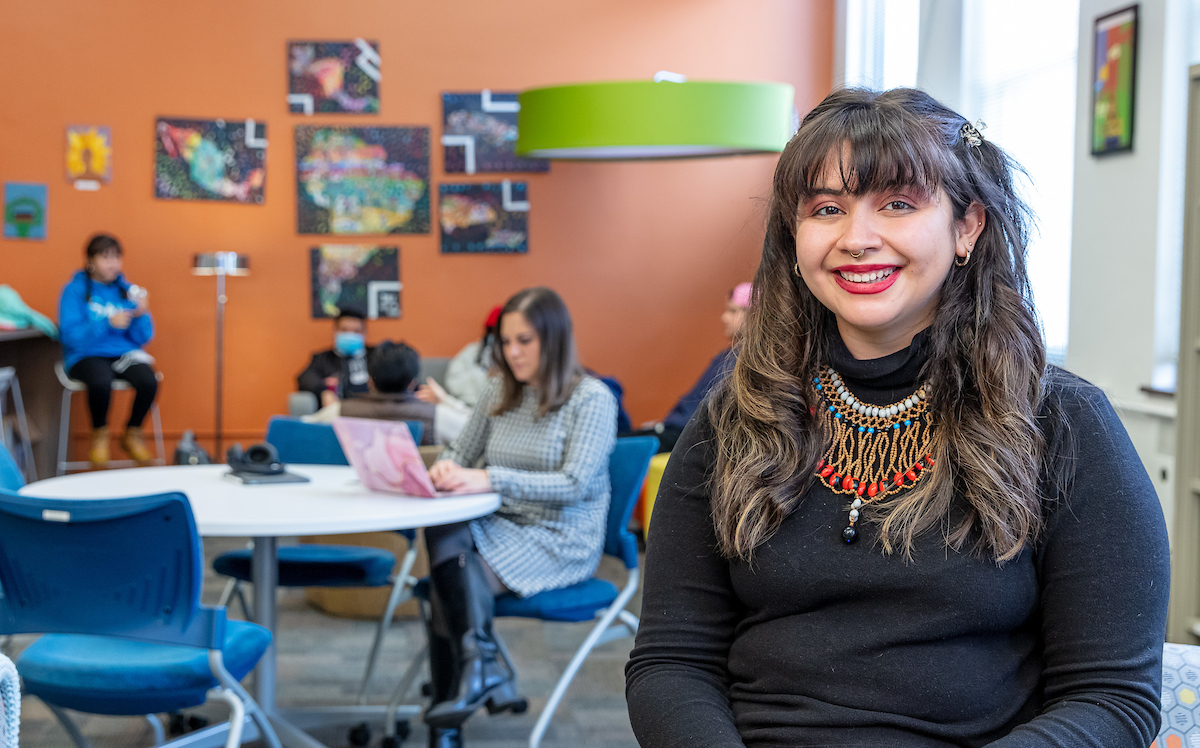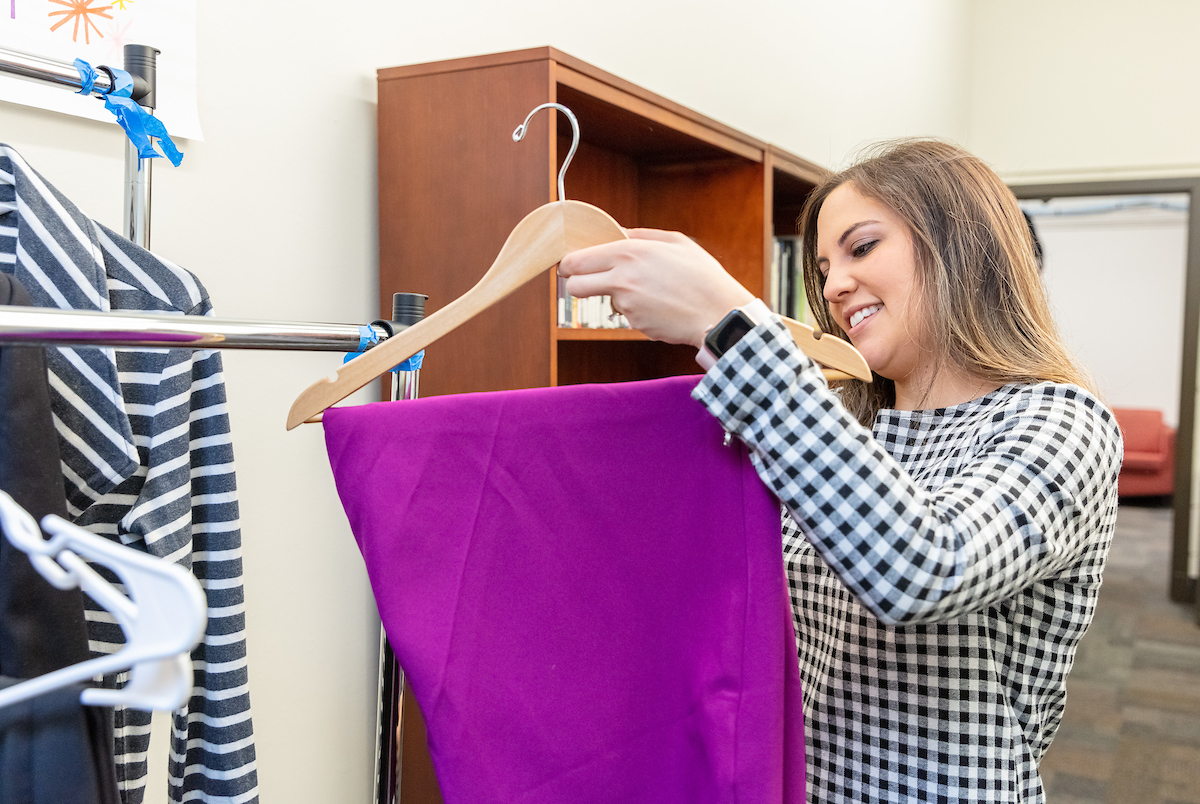 As coordinator for the Latinx Cultural Center, Mariela Aranda works with student leaders and organizations to formulate on-campus resources and connect Latinx students and all DePaul students to Chicago-based resources, opportunities, organizations, community leaders and artists. (DePaul University/Randall Spriggs)
As coordinator for the Latinx Cultural Center, Mariela Aranda works with student leaders and organizations to formulate on-campus resources and connect Latinx students and all DePaul students to Chicago-based resources, opportunities, organizations, community leaders and artists. (DePaul University/Randall Spriggs)[Editor’s note: Newsline asked the coordinators of DePaul’s four cultural resource centers to introduce their programs to the university through a question-and-answer exchange. The third of these articles looks at the Latinx Cultural Center, and others in this series will appear soon in Newsline. The questions are Newsline’s; the answers are those of the coordinator, Mariela Aranda.]
How would you describe the role that the Latinx Cultural Center plays in the life of the university?
The Latinx Cultural Center is a hub for students, student organizations, staff and faculty to connect and build community. In one sense, it is a literal physical space where this happens—a room where relationships are brewed over cups of tea, shared microwave lunches, library books and art supplies. In another sense, it goes beyond the walls of our space. Our students are actively working to build networks and relationships across campus and our city. Folks who are studying remotely this year have been in community with the center without ever stepping foot in it.
What are some of the unique opportunities available to students, faculty and staff only through the Cultural Center?
The space is accessible daily from 9 a.m. to 7 p.m. and is available later by reservation. We also offer student-led programming throughout the year with personality and guidelines that are unique and intersectionality-centered.
Our team strives to make the LCC a welcoming place for all. We open our doors to everyone looking to learn more about Latin American cultures and traditions, the ways in which we can confront marginalization and how our work intersects with other important issues too often treated in silos: LGBTQIA+ issues, Black issues, APIDA issues.
"Latinx" is a label that, for many, can feel confusing, generalized, perhaps even too specific and charged. At the same time, it can feel inclusive and community-oriented. We support students as they navigate these labels, their unique identities, relationships and this institution.
The roles we fall into when entering universities and other predominantly white institutions can feel isolating, as well as inauthentic when they do not match the whole of our identities and values. At the LCC, we want you to feel whole from the minute you walk in. Be your truest self, and we will do the same.
What role does the Cultural Center play in expanding the education DePaul provides?
We have a number of resources in the center, including a library, study spaces and a variety of online, in-person and hybrid programs throughout the year. Our programs are educational and include guest presentations, discussion groups around critical themes and active workshops in which students can practice new skills. We are especially excited to bring more online and hybrid programming, as we’ve already connected with numerous remote students looking for more connections to their peers.
Last fall we had a fantastic Indigenous People's Day celebration. Our presenters provided us with incredible knowledge on pre-colonial practices, including drumming, dance and martial arts, that not only resonated with many of our community but opened new doors of learning and schools of thought for us.
During Black History Month, LCC staff planned a workshop, Confronting Anti-Blackness with Health Promotion and Wellness. Students coordinated the event, curating a whole curriculum for the workshop, as well. Now that curriculum will serve us in future years at DePaul.
What types of social programs do you offer at the Cultural Center for community members?
From casual meet-ups to formalized presentations to art workshops—we offer all kinds of opportunities. This year’s programs have included a body-positive book club, dance performances, graduation celebrations, art and writing workshops and field trips to cultural sites around the city.
 Maria Paz Ribadeneira, a graduate assistant in the Office of Multicultural Student Success, hangs clothes in the Latinx Cultural Center "Warm Closet." (DePaul University/Randall Spriggs)
Maria Paz Ribadeneira, a graduate assistant in the Office of Multicultural Student Success, hangs clothes in the Latinx Cultural Center "Warm Closet." (DePaul University/Randall Spriggs)
Another initiative is our Warm Closet. LCC staff have been working in collaboration with the other centers to collect new and gently used coats, sweaters and winter accessories for students who need them. We firmly believe the cost of winter gear should never be a barrier for a student's wellness. The Closet has seen such great turnover of materials that our staff decided to expand and start a donation-based Dressy Closet with business-professional clothing.
What types of partnerships has the Cultural Center developed around the university?
In my time here, we’ve worked closely with Health Promotion and Wellness, Catholic Campus Ministry, the Center for Latino Research and Latinx cultural student organizations. I appreciate my partners for always focusing on students' holistic growth and wellness, and I look forward to new collaboration opportunities that are coming, including Latinx Graduation Week.
Mariela Aranda is the coordinator for the Latinx Cultural Center.